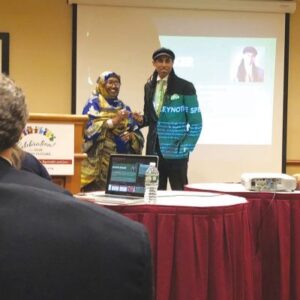
PORTLAND — South Portland City Councilor Deqa Dhalac is fighting for environmental justice and presented the key to the city to environmentalist Dr. Mustafa Santiago Ali on Oct. 17, during his visit to Portland.
Dhalac was invited to attend the 2019 Celebration for Our Healthy Future — which originally was to be located at Bet Ha’am in South Portland.
Because of power outages caused by last week’s nor’easter, the venue was changed to the Clarion Hotel in Portland.
The annual event is hosted by the Environmental Health Strategy Center, a Portland-based program that is working to create a clean, toxic-free future.
When she researched Ali’s work, Dhalac said that she felt inspired and wanted to present him a key to the city, in honor of all the work he had done and to make him feel welcome.
Ali, who is currently vice president of environmental justice, climate and community revitalization for the National Wildlife Federation, was the recipient of the program’s Frank Hatch Award, said communications director Nika Beauchamp.
“He resigned in 2017, when Scott Pruitt was nominated to be the EPA administrator,” said Beauchamp. “He made a very powerful call to fight for the more vulnerable communities. That’s something that’s really central to our community.”
Dhalac said that Ali’s goals aligned with South Portland’s — the city is working to have a clean environment by 2030.
“Tonight’s gathering is a celebration of work and action to protect children and families and their health, regardless of who they are and where they live because all people deserve to live in an environment that is healthy and has clean air and clean water and a community that is toxic free and climate friendly,” Dhalac said to the audience. “I value this work as a professional, as a compassionate community member for children and for the public health in general.”
As a mother and an elected official, Dhalac said that she felt obligated to make the future a healthy one for children and families.
“When it comes to the local government, residents, we all have that one voice at the end of the day,” she said. “The reason we get elected is to protect our residents and I am really humbled to say that I have a little bit of an action to be in it in this fight.”
After Dhalac presented the key, Ali talked to the audience about the work that has been done and still needs to be done in order to protect the health of the nation.
Everyday acts like breathing air and drinking water harm some communities, Ali said, who live in areas where toxins and chemicals affect the environment, causing cancer and liver and kidney disease.
“There is a reason why folks in the late ‘60s and ‘70s worked hard on the clean air and protection act,” he said. “Many folks may be too young to remember when you couldn’t see the sky because of the smog.
“If we allow any administration — it doesn’t matter if they’re democrat, republican or independent — to roll back these types of things, we could easily find ourselves in some very precarious situations again, even without the context of climate change, which we are not going to ignore in my conversation,” Ali continued.
Ali said that the community he grew up in was affected by emissions from mills, which blew across the water into his town.
“Unfortunately, we had a 40 percent cancer rate,” he said. “Sometimes people will get the wrong connections, and they’ll say, ‘well, maybe it’s because you’re a person of color.’ Or, ‘Maybe it’s because of what you ate.’”
Sometimes pollution is invisible, Ali said. The people who are affected by diseases and illnesses from harmful chemicals might not make the connection.
“We see the stuff that comes out of the stacks, and we’re like, ‘that’s pollution—that’s probably not good for us,’” he said. “We see the stuff that comes out of tail pipes out of our diesel trucks and cars, and we know why having the clean car rule is so important — at least, to most of us — but sometimes in the water context, we don’t see it the same.”
This was the case for Arundel farmer Fred Stone, who found perfluoroalkyl substances (PFAS), a dangerous forever chemical that doesn’t break down, in the milk from his cows, said Beauchamp.
Stone was also honored at the celebration, for his efforts to regulate PFAS in Maine soil, to prevent other farms from being contaminated, too.
Beauchamp said a big victory for Environmental Health Strategy Center this year was a legislation passed to prohibit food packaging with PFAS chemicals in Maine by 2022.
Catherine Bart can be reached at cbart@mainelymediallc.com or 780-9029.
Comments are not available on this story. Read more about why we allow commenting on some stories and not on others.
We believe it's important to offer commenting on certain stories as a benefit to our readers. At its best, our comments sections can be a productive platform for readers to engage with our journalism, offer thoughts on coverage and issues, and drive conversation in a respectful, solutions-based way. It's a form of open discourse that can be useful to our community, public officials, journalists and others.
We do not enable comments on everything — exceptions include most crime stories, and coverage involving personal tragedy or sensitive issues that invite personal attacks instead of thoughtful discussion.
You can read more here about our commenting policy and terms of use. More information is also found on our FAQs.
Show less